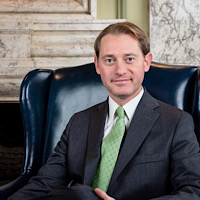Frankfort, Ky. (January 4, 2023) – Secretary of State Michael Adams provided the following testimony today to the House Elections, Constitutional Amendments, and Intergovernmental Affairs Committee, offering a plan to increase the number of voting locations and improve the recount process:
Members of the Committee: good afternoon, and welcome back. I would be proud to serve anywhere as the Secretary of State, but after all we’ve achieved in raising Kentucky’s profile as innovators in election administration over the past 3 years, I’m especially proud to serve as Kentucky’s Chief Election Official.
Before I begin in earnest, let me say thank you, not just for our major election reform legislation in 2021, for which our Commonwealth continues to draw praise from across the country and from our own citizens; but thank you also for continuing that trend of improving our voting process. In 2022, you voted, in bipartisan fashion and nearly unanimously, for a budget that fully funds our elections, for a further expansion of voter access, and for a further tightening of election security. Kentucky is the only state in America that is simultaneously making it easier to vote and harder to cheat.
The subject of this hearing is an overview of the 2022 general election. By all means, we should assess that, and I’ll give you my take; but, as the purpose of this review is to inform potential legislation, I hope you’ll permit me to focus on the future.
I understand the sentiment this session is not to enact many major policy reforms, but rather to return to the focus originally intended for odd-year sessions: tweaks to existing legislation. I totally agree with that as applied to our elections. There has been a lot of change, fast, in our voting process over the last 3 years. That change has been good, but additional large-scale reforms of our election system would not just confuse our voters, they would limit our ability to learn from previous elections and make improvements based on that knowledge – and, of course, they would cost a lot of money in your first non-budget session since 2019.
There are modest things we can do, though, that can have a significant impact.
To reiterate my interim testimony in November, let’s acknowledge that early voting works. At my urging, you acted in bipartisan fashion to enact it, and over a quarter-million voters took advantage of it in the general election. I’ll note that the turnout for early voting correlated pretty closely with the partisan affiliation of our voters – Republicans with a little less than 50%, then Democrats close behind, then Independents. In other words, early voting is not a partisan issue. There is no Republican or Democratic way to vote. Early voting doesn’t favor a side; it just helps the voters. It doesn’t just help the voters who vote early. It also helps the voters who don’t. The counties that had long lines on Tuesday, November 8th, would have had even longer lines had their voters not already had 3 days to vote.
Although I’m proud of early voting, the solution to long lines is not to add more voting days, at least not in a non-presidential election year. More than four times as many voters voted on Tuesday, November 8th, as voted in the 3 early voting days combined. The lesson here is that in order to reduce lines, we need more voting locations, not more voting days.
That is not to say that I did not try in this past election to get more voting locations, even though I lacked the legal authority to compel it. I did place calls to and visit county clerks and request that they open more voting locations. Sometimes they were cooperative, sometimes not. I also had my senior staff, in particular my Elections Director, Heather Quinn, conduct a review of all 120 counties’ election plans. Unfortunately, the Board of Elections expressed impatience with our review, questioned our authority to conduct it, and overruled my objections.
There are a few ways to accomplish an increase in the number of voting locations. One would be to do what we did in 2020, via emergency powers that you granted: we gave the counties flexibility to consolidate voting locations, but they had to get the approval of the Governor and me. I think it’s important that someone politically accountable – whether it’s the Governor, me, both of us, or some other statewide constitutional officer – review and approve a local election plan that reduces voting locations.
An alternative approach to fixing this problem would be to develop a statutory formula to set a floor for how many voting locations a county needs for early voting and election day. I don’t know offhand what that formula should be. It might need to be different in one county than another, because some counties’ voters use early voting more than other counties’ voters. It’s complicated, but I think it’s doable. I’m neutral over which approach you prefer, but we must do something to prevent long lines in the future.
Finally, we should incentivize the counties to open more voting locations when they apply for funds appropriated for this purpose. Let me give you an example: shortly after the election, Carroll County was given a grant of $2,805, based on a formula of $255 per precinct for their 11 precincts. However, in that election, Carroll County offered only 1 voting location. Boyle County was compensated for 25 locations but opened 6; Hardin County was compensated for 59 locations but opened 10. If a county opens 1 voting location, it shouldn’t be compensated as though it had opened 11, and you should consider either directing eligibility for funds be tied to the polls being opened, or you should at least alter any funding formula to award funds to counties based on voter population rather than the number of precincts – indeed, otherwise you create a perverse incentive for counties to create more precincts than they should have, and then to close them.
There’s a second way we can improve the voting experience: close the loophole that allows electioneering at the polls during early voting. KRS 117.235 provides, quote, “No person shall electioneer at the polling place on the day of any election . . . or within a distance of one hundred (100) feet of any entrance to a building in which voting is conducted if that entrance is unlocked and is used by voters on any primary or election day.” This statute also provides, quote, “No person shall electioneer within . . . any building designated by the county board of elections and approved by the State Board of Elections for in-person absentee voting, during the hours in-person absentee voting is being conducted in the building.” So, we’ve prohibited electioneering at the polls on the 6 days of excused in-person absentee voting, and on election day, but not on the 3 days in the middle, the no-excuse early voting days. Some clever candidates took advantage of this in the past election, and voters complained. Applying this prohibition universally should be an easy fix.
And third, we need to improve the recount process, in two ways. Our recount law is fairly new. It was presented last year by Speaker Osborne and Leader Jenkins, who worked together in bipartisan fashion to develop a clear and workable process. They did not foresee that the process would be misused by bad-faith actors, who seek to create unwarranted doubt in the integrity of our elections. Ironically, this measure became law in the same bill that closed the loophole that had allowed bad-faith actors to demand a recanvass even if they lost by a landslide. We should close the same loophole on recounts, which are far more taxing on our election officials than recanvasses. We have a separate law that permits an election challenge upon an allegation of fraud, corruption, or even administrative error, and any person with evidence of same will not lose the right to contest an election; but, the frivolous lawsuits by people who lack evidence of fraud, corruption, or administrative error, and lose by a wide margin, must be stopped. I won’t sugarcoat it: recount abuse contributed to the high attrition we saw last year in county clerks’ offices.
Additionally, you should provide clearer standards in the recount law. For example, we recently saw a recount in a state house election in a district that covered two counties. One county promptly performed a hand recount; ultimately, so did the other, but for a time it appeared they would conduct only a machine recount. We should have not different standards that apply in different counties in the same election. Whichever approach you prefer, you should make it universal.
Although none of these changes is major, they are all important. I am well aware that this is an election year, and the temptation is to do little and leave the election rules alone. I would submit that an election year, particularly one in which we expect close outcomes in major races, is exactly the time to make these modest but crucial improvements to the process. Thank you very much.








